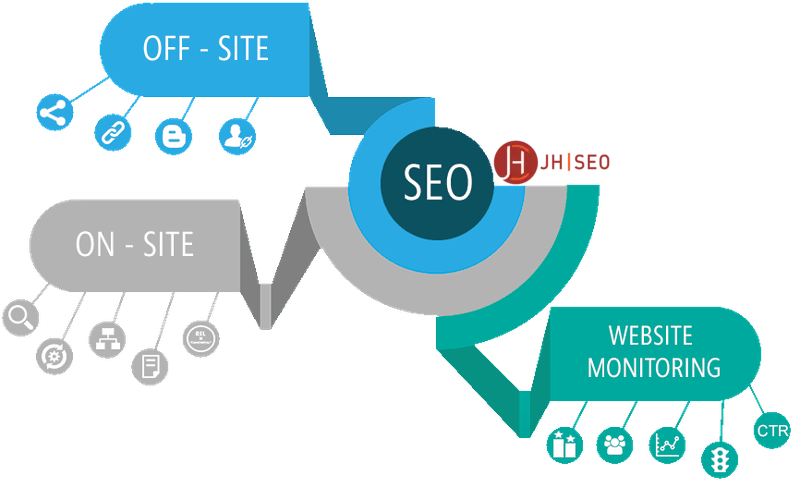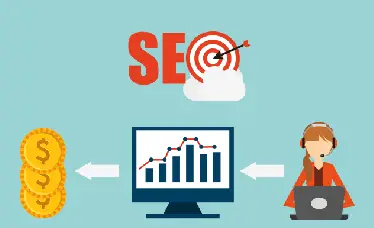Online presence has become an increasingly important element in businesses. SEO involves optimizing your website to improve its visibility on search engines like Google, making it easier for potential customers to find you when searching for relevant products or services. For small businesses, SEO can be a game-changer, providing a cost-effective way to compete with larger competitors and drive organic traffic to your site.
See how effective SEO can drive traffic to your small business website. Learn more.
Whether you’re new to SEO or looking to refine your current strategies, we’ll walk you through the essential steps and best practices to help you optimize your website effectively. By following these guidelines, you’ll be able to enhance your site’s search engine ranking, attract more visitors, and ultimately grow your business.
Understanding SEO Basics
Search Engine Optimization (SEO) is the process of improving your website’s visibility on search engines to attract organic (non-paid) traffic. By optimizing various aspects of your site, you can improve your rankings in search engine results pages (SERPs) and increase your chances of being found by potential customers.
Key Components of SEO
- On-Page SEO: Refers to the elements you can control on your website to improve rankings, such as content and meta tags.
- Off-Page SEO: Involves strategies outside your website, like building backlinks and improving your online presence.
- Technical SEO: Focuses on the technical aspects of your site that affect its performance and indexing, such as site structure and mobile optimization.
On-Page SEO Optimization
Keyword Research
Keyword research is fundamental to SEO. It involves identifying the terms and phrases potential customers use when searching for products or services like yours.
- Importance of Choosing the Right Keywords: Selecting relevant keywords helps ensure your content matches what users are searching for.
- Tools for Keyword Research: Utilize tools like Google Keyword Planner and SEMrush to find effective keywords for your niche.
- Incorporating Keywords Naturally: Integrate keywords into your content naturally, including titles, headings, and body text, to avoid keyword stuffing and ensure readability.
Content Creation
High-quality content is key to attracting and engaging your target audience.
- Writing High-Quality, Relevant Content: Focus on creating content that addresses your audience’s needs and interests.
- Importance of Unique and Engaging Content: Unique content helps differentiate your site from competitors and keeps visitors engaged.
Meta Tags and Descriptions
Meta tags, including title tags and meta descriptions, provide search engines and users with information about your pages.
- Crafting Effective Title Tags and Meta Descriptions: Write clear, compelling titles and descriptions that include your primary keywords and encourage clicks.
- Impact on Search Engine Rankings: Well-crafted meta tags can improve your visibility and click-through rates (CTR).
Maximize your small business website’s impact with expert SEO. Get in touch!
Internal Linking
Internal links connect different pages on your website, enhancing navigation and SEO.
- Using Internal Links: Link to relevant pages within your site to help users find related content and distribute page authority.
- Best Practices for Internal Linking: Create a logical structure with descriptive anchor text to guide users and search engines through your site.
Technical SEO
Website Structure and Navigation
A well-organized website structure improves user experience and search engine indexing.
- Importance of a Clear, User-Friendly Structure: Ensure your site is easy to navigate with a logical hierarchy and intuitive menu.
- Ensuring Easy Navigation and Usability: Use clear labels and a search function to help users find what they need quickly.
Mobile Optimization
With the rise of mobile searches, having a mobile-friendly site is crucial.
- Making Sure Your Website Is Mobile-Friendly: Ensure your site is responsive and provides a seamless experience across all devices.
- Tools for Testing Mobile Responsiveness: Use tools like Google’s Mobile-Friendly Test to check how well your site performs on mobile devices.
Page Speed and Performance
Fast-loading pages are essential for retaining visitors and improving SEO.
- Importance of Fast Loading Times: A quick site enhances user experience and reduces bounce rates.
- Tools and Techniques for Improving Page Speed: Use tools like Google PageSpeed Insights to analyze and improve your site’s loading time through optimizations like image compression and code minification.
Off-Page SEO Strategies
Building Backlinks
Backlinks are links from other websites to your own. They are crucial for small business SEO as they signal to search engines that your content is valuable and trustworthy. Here’s how to effectively build backlinks:
- Guest Blogging: Write and publish articles on other reputable blogs in your industry. In your author bio or within the content, include a link back to your website. This not only provides a backlink but also helps you reach a broader audience.
- Partnerships and Collaborations: Form partnerships with other local businesses or influencers. This could involve co-hosting events, joint ventures, or sponsorships, all of which can result in backlinks to your site. For example, if you sponsor a local charity event, they might link back to your website in their promotional materials.
Social Media Integration
Social media platforms can significantly boost your SEO efforts by driving traffic to your site and enhancing brand visibility. Best practices include:
- Sharing Content: Regularly share your blog posts, articles, and other valuable content on social media platforms like Facebook, Twitter, and LinkedIn. This increases the chances of your content being seen and shared by a larger audience.
- Engaging with Your Audience: Interact with your followers by responding to comments, messages, and reviews. Building a relationship with your audience can lead to more shares and mentions, which indirectly benefit your SEO.
Boost your small business website’s visibility with expert SEO strategies. Get started!
Local SEO Considerations
Google My Business (GMB)
Google My Business is a free tool that helps businesses manage their online presence across Google, including Search and Maps. Optimizing your Google Business profile is essential for local SEO:
- Setting Up Your Profile: Ensure your GMB profile has accurate business information, including your address, phone number, hours of operation, and website URL. Add high-quality photos of your local business and any products or services you offer.
- Updating Regularly: Keep your profile up-to-date with the latest information, such as changes in hours, new services, or special offers. Regular updates help maintain your visibility and engagement with local customers.
Local Citations and Listings
Local citations are mentions of your business on other websites, such as directories or review sites. To effectively manage local citations:
- Consistency of NAP: Ensure your Name, Address, and Phone Number (NAP) are consistent across all online listings and directories. Inconsistent information can confuse search engines and potential customers, negatively impacting your local search rankings.
- Managing Listings: Claim and update your business listings on local directories like Yelp, Yellow Pages, and industry-specific sites. Ensure that your business information is accurate and complete to improve your chances of being listed in local search results.
Local Reviews and Reputation Management
Customer reviews play a significant role in local SEO by influencing rankings and consumer trust. To manage reviews effectively:
- Encouraging Reviews: Ask satisfied customers to leave positive reviews on platforms like Google and Yelp. You can do this through follow-up emails, social media, or in-person requests.
- Responding to Feedback: Address reviews promptly, whether they are positive or negative. Thank customers for their positive feedback and resolve issues mentioned in negative reviews. This not only helps build trust but also shows search engines that you are active in managing your online reputation.
Monitoring and Measuring Success
Key Performance Indicators (KPIs)
Tracking KPIs helps you measure the effectiveness of your SEO efforts. Important metrics to monitor include:
- Organic Traffic: The number of visitors coming to your website from search engines. This indicates how well your SEO is driving traffic to your site.
- Keyword Rankings: Monitor where your site ranks for target keywords. Improved rankings suggest that your SEO strategies are working.
- Conversion Rates: The percentage of visitors who take a desired action, such as making a purchase or filling out a contact form. Higher conversion rates indicate that your site is effectively converting visitors into customers.
Tools for Monitoring SEO Performance
Use SEO tools to gather data and insights about your website’s performance:
- Google Analytics: Tracks website traffic, user behavior, and conversion metrics. It provides detailed reports on how visitors interact with your site, which can help you identify areas for improvement.
- Google Search Console: Provides data on how your site appears in Google search results. It helps you monitor your site’s search performance, detect issues, and understand how Google crawls and indexes your site.
Common SEO Mistakes to Avoid
Keyword Stuffing
Keyword stuffing refers to the excessive use of keywords in your content. This practice can lead to poor user experience and may result in search engine penalties. Instead, focus on creating high-quality, engaging content with natural keyword placement.
Neglecting Mobile Users
With an increasing number of searches happening on mobile devices, it’s crucial to ensure your website is mobile-friendly. A responsive design that adapts to different screen sizes improves user experience and can positively impact your search rankings.
Ignoring Analytics
Failing to track and analyze your SEO performance can lead to missed opportunities for optimization. Regularly review your analytics data to understand what’s working and what isn’t, and adjust your strategies accordingly.
Successfully optimizing a small business website for search engines involves several key steps. From understanding the basics of SEO to implementing on-page and off-page strategies, each element plays a crucial role in improving your online visibility. Key actions include conducting thorough keyword research, creating high-quality content, optimizing technical aspects of your site, and building valuable backlinks.
Enhance your website’s performance with tailored SEO for small businesses. Contact Us or 2138949220!
SEO is not a one-time task but an ongoing process. Continuously refine your approach, stay informed about the latest SEO trends, and adapt your strategies to maintain and improve your search engine rankings. By committing to these practices, you’ll be well on your way to achieving long-term growth and success for your small business.



































































































































































































































